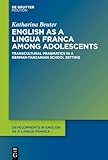English as a Lingua Franca among Adolescents : Transcultural Pragmatics in a German-Tanzanian School Setting / Katharina Beuter.
Material type: TextSeries: Developments in English as a Lingua Franca [DELF] ; 18Publisher: Berlin ; Boston : De Gruyter Mouton, [2023]Copyright date: ©2023Description: 1 online resource (XVIII, 279 p.)Content type:
TextSeries: Developments in English as a Lingua Franca [DELF] ; 18Publisher: Berlin ; Boston : De Gruyter Mouton, [2023]Copyright date: ©2023Description: 1 online resource (XVIII, 279 p.)Content type: - 9783110786491
- 9783110786613
- 9783110786576
- 427
- online - DeGruyter
- Issued also in print.
| Item type | Current library | Call number | URL | Status | Notes | Barcode | |
|---|---|---|---|---|---|---|---|
 eBook
eBook
|
Biblioteca "Angelicum" Pont. Univ. S.Tommaso d'Aquino Nuvola online | online - DeGruyter (Browse shelf(Opens below)) | Online access | Not for loan (Accesso limitato) | Accesso per gli utenti autorizzati / Access for authorized users | (dgr)9783110786576 |
Browsing Biblioteca "Angelicum" Pont. Univ. S.Tommaso d'Aquino shelves, Shelving location: Nuvola online Close shelf browser (Hides shelf browser)
Frontmatter -- Contents -- Acknowledgements -- List of figures, maps and tables -- List of abbreviations -- Part I: Theoretical, empirical and methodological foundations -- 1 Introduction -- 2 Language and culture in English as a Lingua Franca -- 3 ELF pragmatics and interactional linguistics -- 4 Methods and data -- Part II: Communicative aims and interactional strategies -- 5 Communicative aims in TeenELF -- 6 The use of repetitions in TeenELF -- 7 Repair strategies in TeenELF -- 8 The speech act of complimenting in TeenELF -- 9 Laughter and humour in TeenELF -- 10 Translanguaging in TeenELF -- Part III: Discussion -- 11 Summary and critical reflection -- 12 Implications of linguistic findings for language teaching -- 13 Outlook -- Appendices -- Appendix A Transcription key and sample transcript -- Appendix B Fieldwork material -- Appendix C Cross-corpus comparisons -- References -- Index
restricted access online access with authorization star
http://purl.org/coar/access_right/c_16ec
This volume is not only the first book-length investigation into adolescents’ use of English as a Lingua Franca (ELF), it also explores ELF in an African-European context, which has received little attention in ELF research so far. The book examines the interplay between language, culture and identity in adolescents’ ELF interactions. It combines quantitative and qualitative approaches to explore strategies secondary school students employ in a German-Tanzanian student exchange in order to reach their communicative goals. Introducing and drawing on the TeenELF corpus, the book investigates the speaker- and situation-specific potential of repetition and repair, complimenting, laughter and humour as well as various practices of translanguaging. The study reveals ELF as a transcultural space, in which different linguacultural influences meet and merge, while meaning, rapport and identity are interactionally negotiated. In the face of an increasing interest in ELF-informed pedagogy, the present approach investigates the communicative needs and competences of school students and derives both theoretical as well as classroom implications from its linguistic findings.
Issued also in print.
Mode of access: Internet via World Wide Web.
In English.
Description based on online resource; title from PDF title page (publisher's Web site, viewed 25. Jun 2024)









